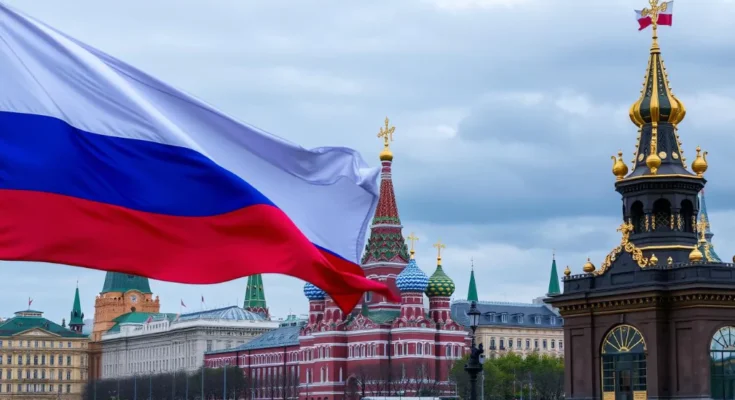How to Find a Job in Russia as a Foreigner
Starting a job search in Russia as a foreigner can be thrilling. The Russian job market is rich with opportunities for expatriates, especially in various sectors. With the right strategy and knowledge, you can successfully explore the Russian work opportunities landscape.
Russia’s diverse economy and rich culture attract many expats looking for new career paths. The country, from its vibrant cities to quaint towns, offers a broad spectrum of job opportunities. By grasping the local job market and preparing well, you can enhance your chances of securing a fulfilling role in this vast and captivating nation.
Key Takeaways
- Russia offers diverse job opportunities for foreigners
- Understanding the local job market is crucial
- Prepare for unique challenges in the Russian work environment
- Language skills can significantly boost your employability
- Networking plays a vital role in finding job opportunities
- Legal requirements and work visas are essential considerations
Understanding the Russian Job Market
The Russian job market presents unique opportunities for foreign workers. To thrive, it’s essential to understand current trends, in-demand industries, and regional variations.
Current Employment Trends in Russia
The Russian job market is witnessing a rise in demand for skilled professionals. The tech sector is at the forefront, with a significant increase in remote work opportunities. Foreign workers are particularly sought after in specialized fields, especially those with international experience.
In-Demand Industries for Foreign Workers
Several sectors actively seek international talent:
- Information Technology
- Finance and Banking
- Education (especially English language)
- Oil and Gas
- Engineering
These industries value foreign expertise and often offer competitive packages to attract top talent.
Regional Job Market Differences
Regional employment opportunities vary significantly across Russia. Major cities like Moscow and St. Petersburg have diverse job markets with numerous multinational companies. Smaller cities and regions may offer fewer options but can provide unique experiences and lower living costs.
| Region | Top Industries | Foreign Worker Demand |
|---|---|---|
| Moscow | Finance, IT, Consulting | High |
| St. Petersburg | Tourism, IT, Manufacturing | Medium-High |
| Siberia | Oil & Gas, Mining | Medium |
| Far East | Fishing, Timber, Agriculture | Low-Medium |
Understanding these regional nuances can help you target your job search effectively. It ensures you find the best fit for your skills and preferences in the Russian job market.
Legal Requirements for Working in Russia
Understanding the legal requirements for working in Russia can be challenging. However, grasping the process is essential for a seamless transition. We will outline the main steps to obtain your Russian work visa and meet legal employment standards.
Work Visa Types and Requirements
Russia provides various work visas, each designed for different employment scenarios. The standard work visa is valid for up to three years. For those with advanced skills, a special work visa offers extra perks. To apply, you need a job offer, a valid passport, and an employer’s invitation.
Work Permit Process
Securing a work permit in Russia involves several steps:
- Your employer must secure a quota for foreign workers
- You’ll undergo a medical check
- Submit all necessary documents to the migration authorities
- Pay the required fees
Registration and Documentation
After arriving in Russia, you must register with local authorities within seven days. Carry your work permit, visa, and registration documents always. Employers often help with this, but it’s your duty to ensure you comply with all legal requirements.
“Proper documentation is your key to a worry-free work experience in Russia. Always stay on top of your paperwork!”
It’s crucial to start the visa and work permit process early. Collaborate closely with your potential employer. They are essential in obtaining the necessary documents for your Russian work visa.
Essential Russian Language Skills
Mastering Russian for work is crucial when seeking employment in Russia. Many companies require a certain level of Russian proficiency. This makes language skills a key factor in your job search. The extent of Russian needed often depends on your industry and position.
In international firms or IT sectors, English might suffice. Yet, learning business Russian can significantly boost your career prospects. It demonstrates commitment and helps you integrate into the workplace culture.
Language requirements vary across industries. Here’s a breakdown of typical Russian proficiency levels needed:
| Industry | Required Russian Level | Notes |
|---|---|---|
| IT | Basic to Intermediate | English often accepted |
| Finance | Advanced | Precise communication needed |
| Education | Intermediate to Advanced | Depends on teaching level |
| Hospitality | Intermediate | Customer interaction focus |
To improve your Russian skills, consider enrolling in language courses, using language apps, or finding a language exchange partner. Remember, learning Russian is an investment in your professional future in Russia.
How to Find a Job in Russia as a Foreigner
Securing employment in Russia as a foreigner demands a blend of effective job search tactics and unwavering determination. This guide aims to guide you through the complexities of the Russian job market. It’s designed to boost your prospects of securing a rewarding role.
Online Job Platforms
Starting with Russian job boards is a wise move. Sites like HeadHunter, SuperJob, and Rabota.ru offer a plethora of opportunities across diverse sectors. Additionally, international platforms such as LinkedIn and Indeed feature Russian job listings.
Networking Strategies
In Russia, networking is key for job seekers. Engage with professional groups on social media, participate in industry events, and connect with expat communities. Such connections can yield valuable job opportunities and insights into companies that welcome international talent.
Recruitment Agencies
For foreign job seekers, specialized agencies can be a game-changer. They often have ties with companies eager to hire international talent. Agencies like Kelly Services, Manpower, and Antal Russia can assist with the application process.
Company Direct Applications
Directly approaching companies is also a viable strategy. Identify firms in your field that have a track record of hiring foreigners. Customize your application to emphasize how your international experience can add value to their organization.
| Job Search Method | Pros | Cons |
|---|---|---|
| Online Job Platforms | Wide range of listings | High competition |
| Networking | Access to hidden job market | Time-consuming |
| Recruitment Agencies | Specialized support | May have fees |
| Direct Applications | Shows initiative | Lower success rate |
By employing a combination of these strategies, you can significantly enhance your job search prospects in Russia. Persistence is crucial, and don’t underestimate the value of showcasing your unique international professional skills.
Creating a Russian-Style Resume
To succeed in the Russian job market, it’s crucial to grasp the unique expectations of employers. A well-crafted Russian CV format can greatly enhance your interview prospects.
Format and Structure
The Russian resume format is chronological. Begin with your personal details, such as full name, date of birth, and contact information. Then, list your education, followed by work experience in reverse chronological order. Don’t forget to highlight language skills and any additional qualifications.
Key Information to Include
When preparing your resume for the Russian job market, focus on these key elements:
- Personal details: Full name, date of birth, contact information
- Education: Degrees, institutions, graduation dates
- Work experience: Company names, positions, dates, responsibilities
- Language skills: Proficiency levels in Russian and other languages
- Additional qualifications: Certifications, awards, relevant skills
Common Mistakes to Avoid
Avoid these common errors when creating your Russian-style resume:
- Omitting personal details like date of birth
- Using a photo that’s too casual or unprofessional
- Failing to translate educational qualifications to Russian equivalents
- Neglecting to mention Russian language proficiency
By adhering to these resume writing tips and adapting to the Russian CV format, you’ll significantly boost your job search success in Russia.
Job Interview Preparation in Russia
Preparing for a job interview in Russia means grasping local customs and expectations. Employers here value professionalism and formality. Dress conservatively, with men in suits and women in business attire. Being punctual is key, so arrive 10 minutes early.
During the interview, keep eye contact and show confidence. Russian interviewers want you to clearly state your skills and experiences. Be ready to delve into your educational background and work history.
Common interview questions in Russia include:
- Why do you want to work in Russia?
- What are your long-term career goals?
- How do you handle challenging situations at work?
- What are your salary expectations?
Cultural considerations are crucial in Russian job interviews. Avoid casual behavior or humor, seen as unprofessional. Show yourself as competent and reliable instead.
Research the company well before the interview. Russian employers value candidates who know about their organization and industry. Prepare questions about the company’s operations and future plans.
“In Russia, a firm handshake and direct eye contact are essential for making a positive first impression during job interviews.”
By following these Russian job interview tips and maintaining proper etiquette, you’ll boost your chances in the Russian job market.
Salary Expectations and Benefits
Understanding Russian salary ranges and employee benefits is crucial for foreign job seekers. Let’s explore what you can expect in terms of compensation and perks when working in Russia.
Average Salaries by Industry
Russian salary ranges vary widely across industries and regions. In major cities like Moscow and St. Petersburg, salaries tend to be higher than in other areas. Here’s a snapshot of average monthly salaries in some key sectors:
| Industry | Average Monthly Salary (RUB) |
|---|---|
| IT and Technology | 150,000 – 250,000 |
| Finance and Banking | 120,000 – 200,000 |
| Oil and Gas | 180,000 – 300,000 |
| Education | 50,000 – 80,000 |
| Healthcare | 70,000 – 120,000 |
Standard Benefits Package
Employee benefits in Russia often include:
- Paid vacation (minimum 28 calendar days per year)
- Sick leave compensation
- Maternity/paternity leave
- Pension contributions
- Health insurance
Negotiation Tips
When engaging in salary negotiation, research industry standards and be prepared to discuss your skills and experience. Russians appreciate directness, so be clear about your expectations. Remember that many companies offer performance-based bonuses, which can significantly boost your total compensation.
Cultural Aspects of Russian Workplace
For foreigners looking to work in Russia, grasping the local work culture is essential. The Russian workplace is distinct, influencing daily interactions and expectations.
Business Etiquette
In Russia, business etiquette demands formality and respect. Greetings typically involve a firm handshake and direct eye contact. Professional settings often require suits and formal attire.
Communication Styles
Communication in the Russian workplace is direct and hierarchical. Managers often make decisions unilaterally. Face-to-face interactions are valued, with phone calls preferred over emails for critical matters.
| Aspect | Russian Style | Western Style |
|---|---|---|
| Decision Making | Top-down approach | Collaborative approach |
| Feedback | Direct and blunt | Often softened or indirect |
| Meetings | Formal, with clear agendas | Can be more casual and open-ended |
Work-Life Balance
The Russian view on work-life balance is changing. Younger generations are advocating for more flexibility. Many companies provide standard benefits like paid vacation and sick leave.
“In Russia, building personal relationships with colleagues is often seen as important for professional success.”
Adapting to Russian work culture requires patience and observation. By embracing these cultural nuances, foreign workers can navigate the Russian workplace more effectively and build strong professional relationships.
Popular Cities for Foreign Workers
Russia’s urban job markets are diverse, attracting expats with new opportunities. Several cities are particularly welcoming to foreign workers. These cities offer a unique blend of charm and career prospects.
Moscow, the capital, is a hub of economic activity and international culture. It has a wide range of industries, from finance to technology. This makes it a prime destination for skilled professionals. St. Petersburg, with its rich cultural heritage, combines history and modernity. It’s growing in IT and tourism.
Yekaterinburg, a major industrial center, draws foreign workers in manufacturing and engineering. Novosibirsk, in Siberia, is a scientific hub, ideal for researchers and academics. Kazan, with its multicultural background, offers opportunities in education and innovation.
| City | Key Industries | Expat Community | Cost of Living |
|---|---|---|---|
| Moscow | Finance, Tech, Media | Large | High |
| St. Petersburg | IT, Tourism, Culture | Medium | Moderate |
| Yekaterinburg | Manufacturing, Engineering | Small | Low |
| Novosibirsk | Science, Research | Small | Low |
| Kazan | Education, Innovation | Growing | Moderate |
Each city provides a distinct living experience. From Moscow’s fast pace to the relaxed vibe of smaller cities. Think about job opportunities, cost of living, and cultural fit when picking your Russian city.
Conclusion
Exploring career opportunities in Russia as a foreigner is both thrilling and challenging. Understanding the job market and legal requirements is essential. The country’s booming industries and varied regional markets provide numerous options for those seeking international roles.
Developing a strong grasp of the Russian language and familiarizing yourself with local business norms are key. Crafting a resume tailored to the Russian job market, excelling in interviews, and grasping salary norms are vital. Many expatriates have thrived in Russia, demonstrating that success is attainable with the right strategy.
As you delve into your job search, remember the importance of persistence and cultural awareness. Russia’s workplaces blend tradition with modernity, offering a unique experience for international professionals. Armed with determination and the knowledge from this guide, you’re ready to embark on your Russian career journey.



